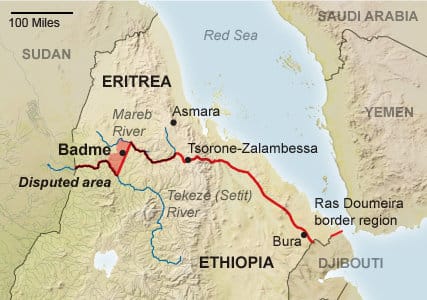Does light seem to be shining at the end of the tunnel for neighbouring Ethiopia and Eritrea after all? According to Ethiopia's new prime minister, Abiy Ahmed, there is. At a press conference, he revealed that Ethiopia will recognise and implement the 2000 peace treaty between the two countries. This, according to the international community and Ahmed, should lead to reconciliation between the African neighbours, who have been fighting each other for years over control of the border town of Badme. This conflict has led to more than tens of thousands of people being killed and also triggered a large migration flow. By officially recognising the agreement, Ahmed hopes it will open the door to peace and prosperity in the Horn of Africa.
The next step
As Ethiopia heads towards peace with Eritrea, other conflicts still need to be resolved before there is real talk of 'peace between the two brotherly nations'. In doing so, there are key elements that need to be raised during a dialogue, should it take place. For instance, Ethiopia and Eritrea have repeatedly accused each other of arming extremist groups. To ensure security around the borders, the accusations against each other must stop and there should be a "mutual security guarantee" should come: one agreement in which the security of both countries remains guaranteed.
Ethiopia has shown by withdrawing its forces at Badme that they are indeed ready to bury the hatchet. Moreover, Ethiopia has argued that the UN Security Council should reconsider the sanctions placed on Eritrea. By initiating all this, Ahmed hopes to start a dialogue with Eritrea's president Isaias Afewerki. But the question remains whether Eritrea's totalitarian leader will heed the Ethiopian prime minister's gesture.
Peace, prosperity or self-interest
After Eritrea gained independence from Ethiopia in 1993, Ethiopia was cut off from access to the Red Sea. As Ethiopia declares peace to its neighbour, the question arises whether it is not self-serving. Before the war, the country had full access to the ports of Assab and Massawa. This provided easy access to Ethiopia even overseas, boosting its economy.
According to the ruling Ethiopian People's Revolutionary Democratic Front (EPRDF) party, it is high time to improve the country's economic situation. Ethiopia currently has barely any financial reserves and is known as one of the most closed economies in Africa. By lifting the state of emergency in the country and opening its borders with Eritrea, the country can again benefit from emerging regional and international trade. Nevertheless, in the longer term, peace between these two countries could also open the doors to a fair and peaceful trade policy. But before that happens, the two countries will have to come to the table to officially declare peace once again.
By: Remy van Aanholt
Photo: Joe Burgess, The New York Times




